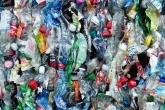Gov consulting on mass balance approach for Plastic Packaging Tax
The Government has launched a consultation on the potential to adopt a mass balance approach for the chemical recycling of plastic in the Plastic Packaging Tax. The consultation was first announced in May 2023 and opened yesterday (18 July). It will run for 12 weeks, ending on 10 October 2023.
 The consultation explores the mass balance approach, mass balance models, and the use of certification schemes to track plastic packaging recycling through its value chain. The mass balance approach is a method of determining the recycled content in plastic packaging.
The consultation explores the mass balance approach, mass balance models, and the use of certification schemes to track plastic packaging recycling through its value chain. The mass balance approach is a method of determining the recycled content in plastic packaging.
HM Revenue and Customs (HMRC) believes that taking the mass balance approach could help to channel investment into chemical recycling, which will be required to develop solutions for harder-to-recycle plastics such as flexible or black plastics.
Alongside views on the case for allowing a mass balance approach, the consultation is calling for responses on the controls that should be introduced to ensure the integrity of the tax.
It also seeks views on the medical exemption for the packaging used for medicine. At present, there is an exemption in the tax for the packaging of licensed human medicines as the process of receiving certification is too time-consuming. However, as chemical recycling can produce recycled plastic which is indistinguishable from virgin plastic, the policy justification for this exemption may diminish as more chemically recycled plastic becomes available.
Currently, the tax allows for both pre- and post-consumer plastic waste to be reprocessed and treated as recycled plastic. These generally require very different levels of recycling, with post-consumer waste needing significantly more sorting and processing to produce usable recycled material with associated higher costs in comparison with pre-consumer waste.
In most cases, it is more cost-effective and efficient to recycle pre-consumer waste even without the exemption from the Plastic Packaging Tax, and it has a better environmental outcome than disposal by way of landfill or incineration. As such, reuse of pre-consumer waste is already built into many production processes
If a mass balance approach for chemically recycled plastic is introduced, the government is considering removing pre-consumer waste as a source of recyclate for the tax. This would remove the disparity in costs between recycled pre-consumer waste and post-consumer waste, including post-consumer waste that can only be chemically recycled. The consultation is also seeking views on this.
Speaking at an INCPEN event ‘Mobilising together on the Government’s plans for plastics’ in London today (19 July), Mark Palmer, Senior Policy Adviser for HMRC and lead official on the consultation, said that the Plastic Packaging Tax provides an economic incentive to increase the usage of recycled plastic packaging, thus stimulating the collection of plastic waste and reducing the volume going to landfill or incineration.
However, Palmer stressed that the tax's primary objective is not revenue generation, but to maximise recycled content.
He noted: "There is no point in us coming up with a system that works beautifully and meets all the environmental objectives, but requires every business in the supply chain to employ three more full-time people just to keep up."
Post-consultation, responses will be reviewed, with further action tied to the budget cycle and finance bills. Palmer assured that the consultation is just the beginning of an ongoing dialogue with stakeholders.
Mass balance approach for plastic packaging
A ‘mass balance approach’ is used to calculate the percentage of chemically recycled content included in plastic packaging.
This means that a set portion of recycled content overall is verified by a third-party certificate. The flow of recycled feedstock can therefore be traced across a supply chain using ‘chain of custody’ models that are designed to create transparency at all levels of the industry.
The mass balance approach is an example of a chain of custody model which exists to verify the process and the percentage of chemically recycled content. Certification schemes include ISCC Plus, REDCert and the RSB Advanced Products. 









